
| Centre Name: | 
Centre for Cybersecurity (CCS) |
| Chairperson: | Dr. Yap Wun She |
| Description of Centre: | Centre for Cyber Security (CCS) was founded by the Lee Kong Chian Faculty of Engineering and Science (LKC FES), Universiti Tunku Abdul Rahman (UTAR) in January 2016. This centre aims to attract significant external research grants and encourage multidisciplinary collaborations. In addition, CCS was formed to demonstrate national leadership and international recognition for excellence in the area of cyber security. Goal: To become a recognized centre of excellence for the field of cyber security internationally. Aim: To promote and lead research and development, technology transfer and training of experts in the area related to cyber security to enhance competitiveness of local industries in global market through the collaborations among the members and external parties. Objectives:
|
| Research area: |
• High speed realization of cryptographic primitives
|
| NO. | NAME | FACULTY | MEMBER |
|---|---|---|---|
| 1 | Ir. Prof. Dr. Goi Bok Min | LKC FES | Member |
| 2 | Dr. Lee Wai Kong | FICT | Associate member |
| 3 | Dr. Denis Wong Chee Keong | LKC FES | Member |
| 4 | Dr. Robithoh | FICT | Member |
| 5 | Dr. Tee Yee Kai | LKC FES | Member |
| 6 | Mr. Chai Tong Yuen | LKC FES | Member |
| 7 | Ms. Wong Kuan Wai | LKC FES | Member |
| 8 | Mr. Chong Kah Meng | LKC FES | Member |
| No. | Date | Event |
|---|---|---|
| 1 | 23-26 February 2019 | Be technical co-sponsor of ICDSP 2019 |
| 2 | 13-Mar-19 | Explore collaborations on AI with Vitrox |
| 3 | 14-Mar-19 | Explore collaborations on AI/Blockchain with Mr. Tony Er from Dagangan Halal |
| 4 | 23-Apr-19 | Explore collaborations on AI with Dr. Alan Lam from City University, Hong Kong |
| 5 | 2-May-19 | Explore collaborations on AI/Cyber Security with Mr. Cheah Kok Hoong from Hitachi Sunway |
| 6 | 13-May-19 | Explore collaborations on AI/Cyber Security with Prof. Qing from Guangxi University for Nationalities, China |
| 7 | 11-Oct-19 | Jointly organized LKC FES postgraduate colloquium |
| 8 | 26 -28 November 2019 | Organizer of ISPEC 2019 |
| 9 | 3-5 November 2019 | Setup CCS booth at KLESF 2019 |
| No. | Activity | |
|---|---|---|
| 1 | Booth of Centre for Cyber Security for KLESF 2019 Date: 1-3 November 2019 CCS and Malaysian Society for Cryptology Research (MSCR) co-setup a booth for KLESF 2019 at MINES International Exhibition and Convention Centre (MIECC) during 1-3 November 2019 with the following objectives: 1. To introduce and promote cyber security. 2. To demonstrate basic cryptography ciphers using simple Python programming. 3. To introduce various types of combinatorial games and their applications to real world problems. Introduction: The objective of these activities is to introduce some basic ciphers / cryptosystems in cryptography to younger generation. In align with the revoultion of industry 4.0 and the advancement of IoT devices, the promotion of the awareness of cybersecurity is important. Besides that, by attending the mini workshop on Phython and by playing the proposed pencil-and-paper games, participant can appreciate the importance of combinatorial mathematics in cryptography and it applications to the field of engineering and computer science. Activities: A. Reverse and Ceaser Ciphers In this mini workshop, participant will be introduced to two basic ciphers in cryptography, which are, the Reverse cipher and the Ceaser cipher. Participant will be given the chance to explore to Python programming which is used to implement the mentioned ciphers. Instructor will guide participants to modify the encrypted message and modify the Python source code. A sample source code is shown in the following Figures 1 and 2. Throughout this mini workshop, participants are exposured to simple cryptography primitives and also will appreciate the power of programming in the implementation of simple algorithm. B. A graph game: Game of Sim Sim is a pencil-and-paper game that is played by two players. On a paper six dots are drawn. Each dot is connected to every other dot by a line. Two players will take turn to color any uncolored lines. One player colors in one color, and the other colors in another color, with each player trying to avoid the creation of a triangle made solely of their color. The game is restricted by the constraints - only triangles with the dots as corners count; intersections of lines are not relevant. At the end of the game, the player who completes a triangle loses immediately. Refer to Figure 3 for a simle illustration. The six dots with all lines connected between any two dots give a complete graph K_6, and the famous Ramsey theorem asserts that K_6 must contain a monochromatic triangle, and hence there is no tied game. Applications: Complete graph analysis Computer network design Cryptography attacks C. A combinatorial game: Dots and Boxes Dots and Boxes is a pencil-and-paper game for two players. The game starts with an empty grid of dots. Two players take turns adding a single horizontal or vertical line between two unjointed adjacent dots. A player who completes the fourth side of a 1×1 box earns one point and takes another turn. A point is typically recorded by placing a mark that identifies the player in the box, such as an initial. The game ends when no more lines can be placed. The winner is the player with the most points. Refer Figure 4 for a simple game illustration. The board may be of any size grid. When short on time, or to learn the game, a 2×2 board (3×3 dots) is suitable. After completing this game, the gamer will be explained on how to use chain, double-cross and open first long chain strategies to win the game. In combinatorial game theory, dots and boxes is an impartial game and many positions can be analyzed using Sprague–Grundy theory. |
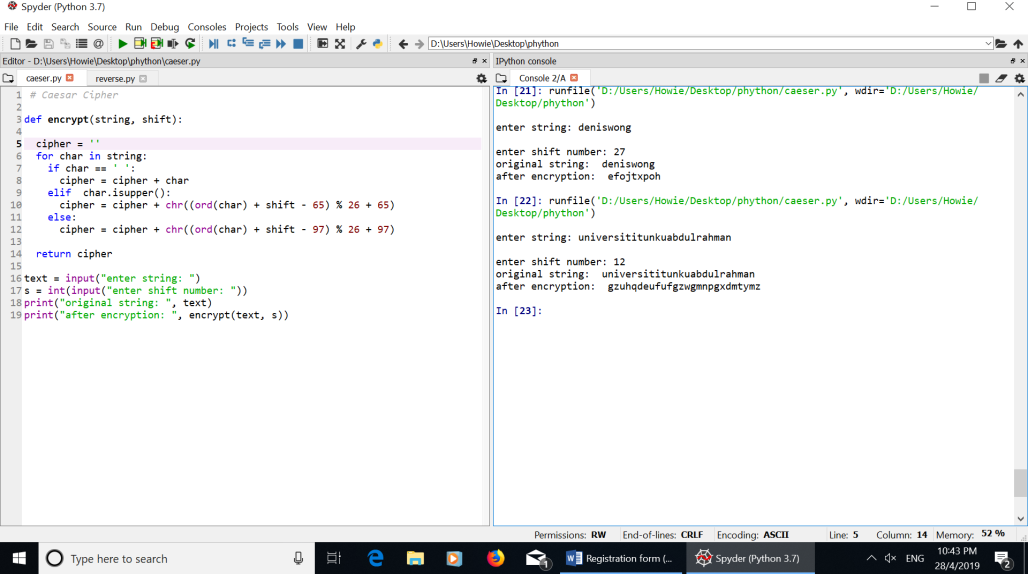
Figure 1: Reverse cipher source code 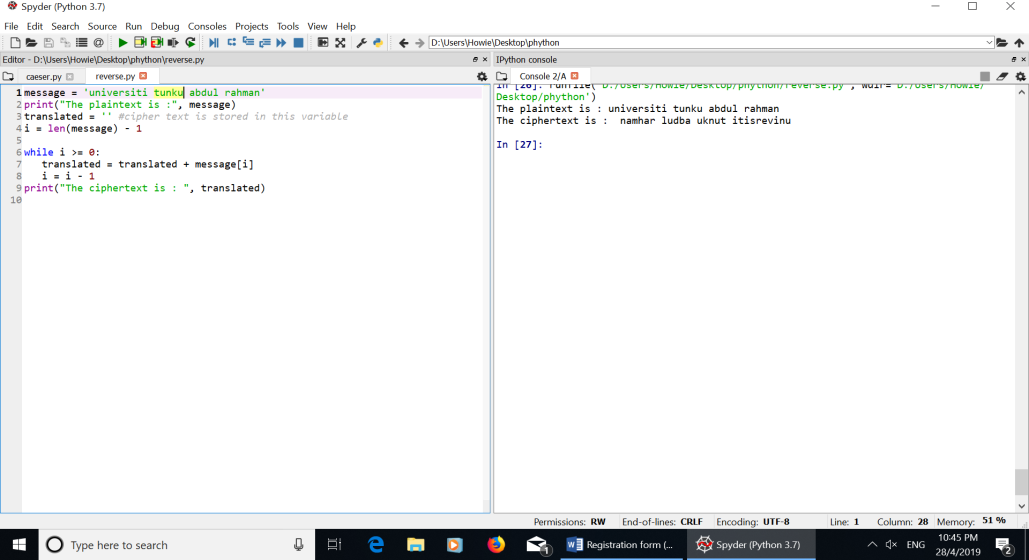
Figure 2: Reverse cipher source code 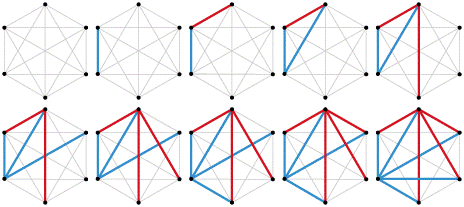
Figure 3: Game of sim illustration 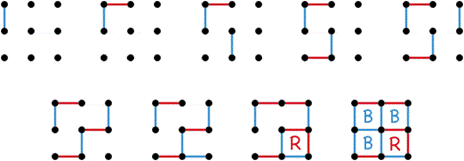
Figure 4: Dots and Boxes illustration. 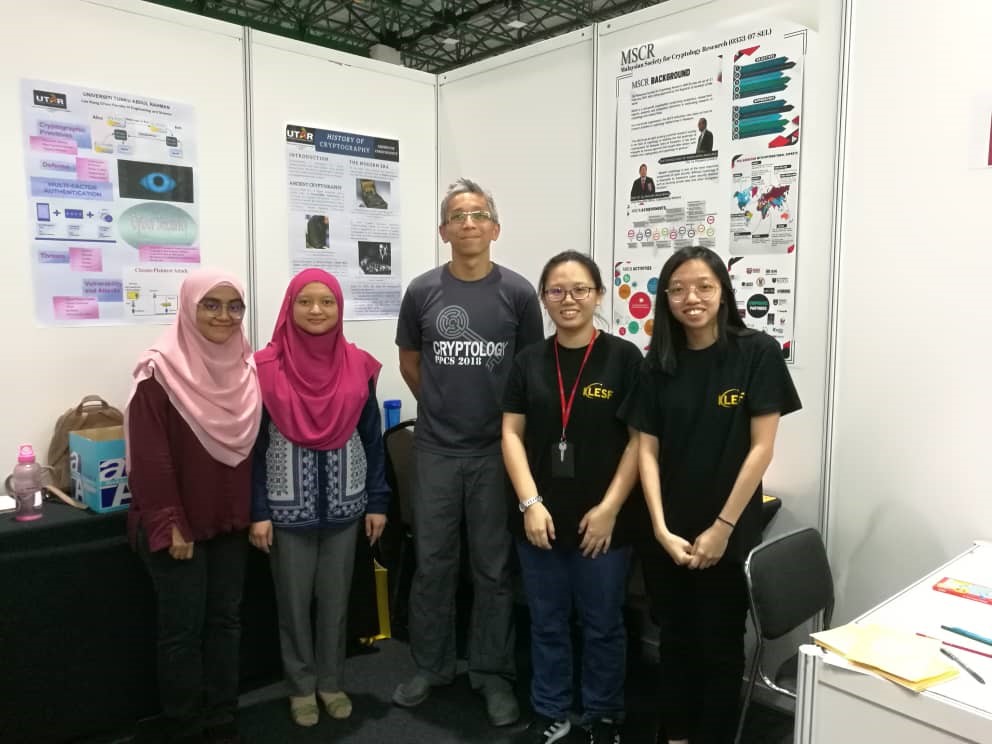
|
| 2 | The 15th International Conference on Information Security Practice and Experience (ISPEC 2019)
Date: 26 – 28 November 2019 The 15th International Conference on Information Security Practice and Experience (ISPEC 2019) was held in Kuala Lumpur, Malaysia, November 26–28, 2019, and hosted by Universiti Tunku Abdul Rahman (UTAR), Malaysia through CCS. The ISPEC conference series is an established forum that brings together researchers and practitioners to provide a confluence of new information security technologies, including their applications and their integration with IT systems in various vertical sectors. In previous years, ISPEC has taken place in Singapore (2005), Hangzhou, China (2006), Hong Kong, China (2007), Sydney, Australia (2008), Xi’an, China (2009), Seoul, South Korea (2010), Guangzhou, China (2011), Hangzhou, China (2012), Lanzhou, China (2013), Fuzhou, China (2014), Beijing, China (2015), Zhangjiajie, China (2016), Melbourne, Australia (2017), and Tokyo, Japan (2018). All the ISPEC papers were published by Springer in the LNCS series. Acceptance into the conference proceedings is very competitive. This year the conference received 68 anonymous submissions from 24 countries/regions. All the submissions were reviewed by experts in the relevant areas on the basis of their significance, novelty, technical quality, and practical impact. After careful reviews and intensive discussions by at least three reviewers for each submission, 21 full papers and 7 short papers were selected from 19 countries for presentation at the conference and inclusion in this Springer volume, with an acceptance rate of 31%. The accepted papers cover multiple topics in information security, from technologies to systems and applications. This state of affairs reflects the fact that the research areas covered by ISPEC are important to modern computing, where increased security, trust, safety, and reliability are required. Total participants is around 80 across the world. ISPEC 2019 was made possible by the joint effort of numerous people and organizations worldwide. There is a long list of people who volunteered their time and energy to put together the conference and who deserve special thanks. First and foremost, we are deeply grateful to all the PC members for their hard task of reading, commenting, debating, and finally selecting the papers. We are indebted to the PC’s collective knowledge, wisdom, and effort, and we have learned a lot from the experience. The committee also used external reviewers to extend the expertise and ease the burden. We wish to thank all of them for assisting the PC in their particular areas of expertise. It was a truly nice experience to work with such talented and hard-working researchers. We also would like to express our appreciation to the keynote speakers: Prof. Chris Mitchell, Assoc. Prof. Hongjun Wu, and Dr. Tieyan Li. Last but certainly not least, our thanks go to all the authors, the attendees, the programme chairs (Prof. Javier Lopez and Prof. Swee-Huay Heng) and the sponsor Huawei International. The conference was also supported by the Malaysian Society for Cryptology Research (MSCR) and Guangxi University for Nationalities, China. |
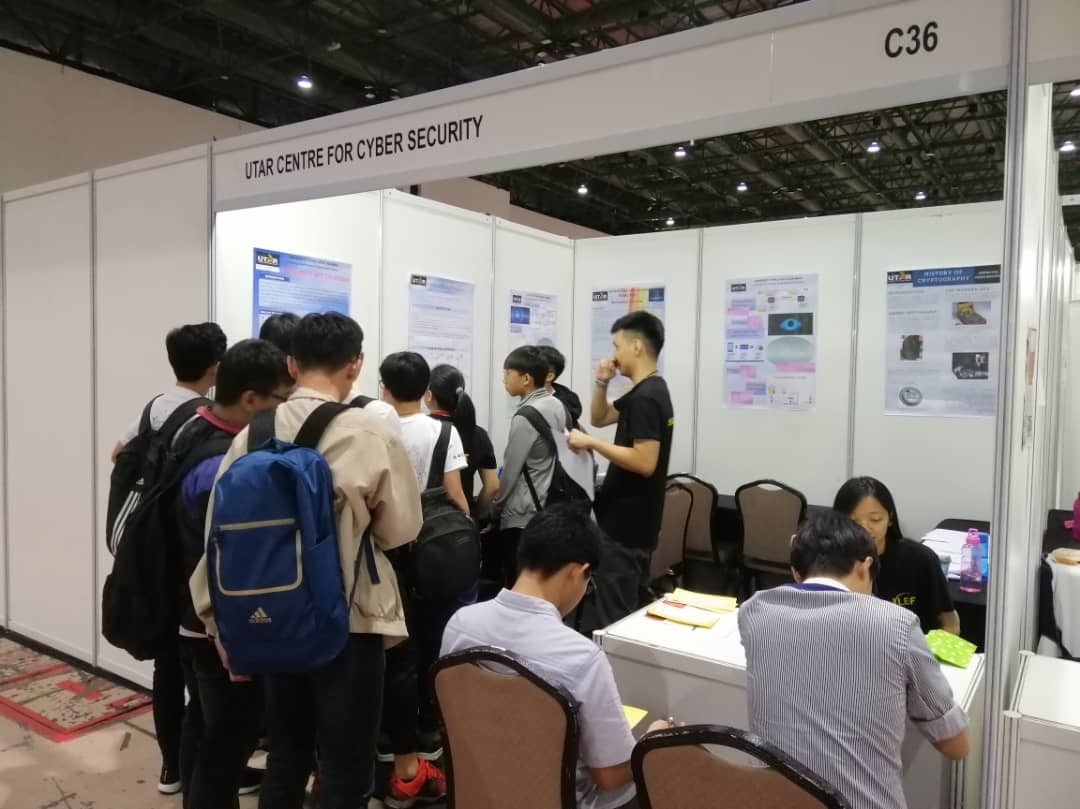
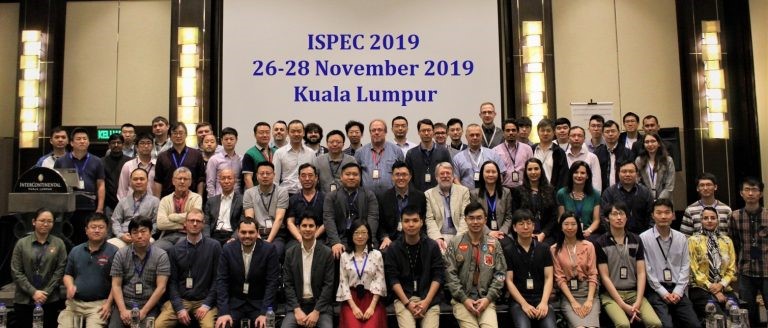
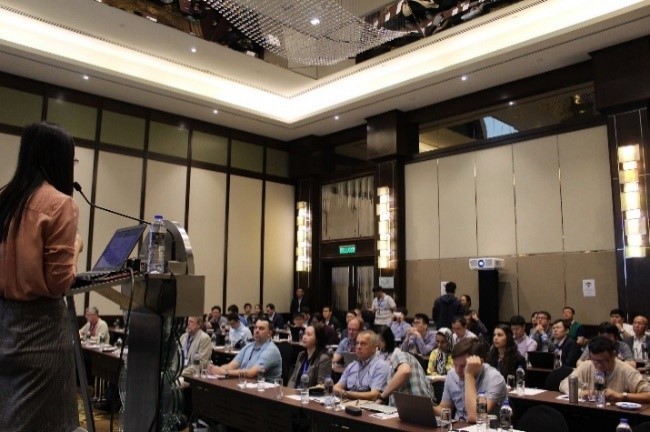
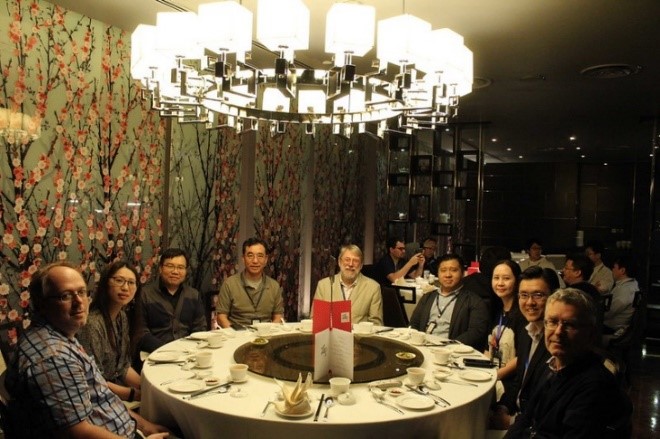
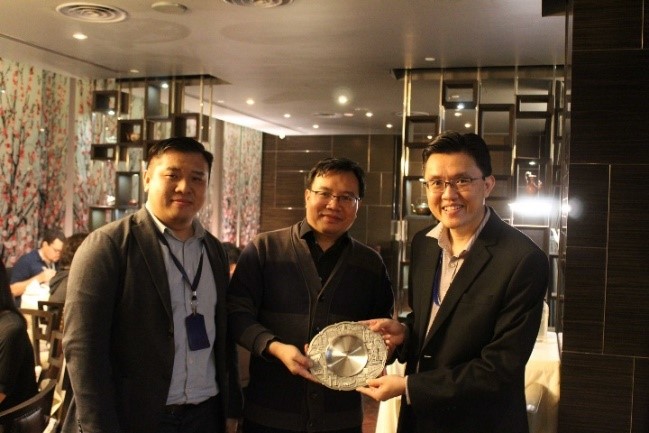
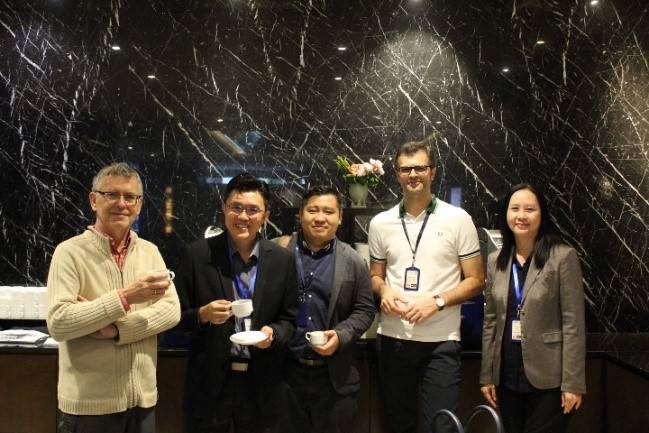
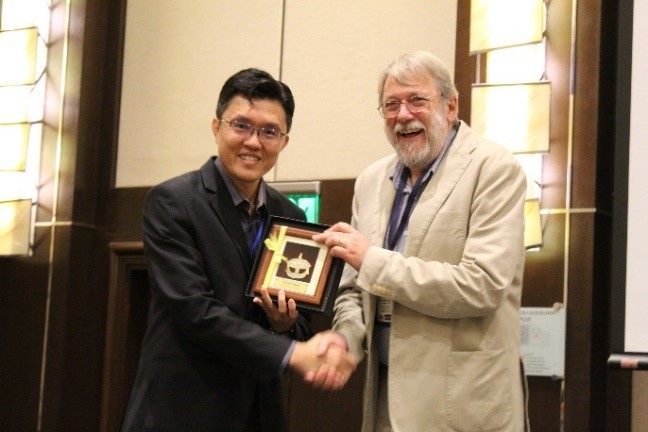
|
| 3 | Second LKC FES Postgraduate Programme
Date: 11 October 2019
The LKC FES Postgraduate Colloquium 2019 was held on 11 October 2019 from 9.30am to 5.00pm. This colloquium was organized by Lee Kong Chian Faculty of Engineering and Science (LKC FES) with eleven research centres in which supervisors of the postgraduate students are parked under these research centres. The aim of the colloquium was to provide a platform for the postgraduate students in LKC FES to present their recent works or findings in their fields of research. It will also serve as a platform for postgraduate students and academic staff of LKC FES to exchange ideas and gather feedback on their research works. This event was co-organized by 11 research centres including Centre for Cyber Security. The colloquium was taken part by 81 participants including postgraduate students and lecturers. There were 41 postgraduate students took part as the presenter to present their research works in the colloquium. The event was officiated by Ir Prof Dr. Goi Bok Min, Dean of LKC FES. After that, the event was continued with the keynote speeches by Prof. Dr. Kuen-Song Lin (Yuan Ze University, Taiwan) which discussed on the “Strategies, Development, and Application of AI/IoTs/Smart Manufacturing of Industry 4.0 on Communication, Engineering, Health Care, and Environmental Science” and Ir Dr Ts Jeffrey Yap Boon Hui (Universiti Tunku Abdul Rahman, Malaysia) on “Capability building towards improved project performance: Capitalising learning and communication in construction” The postgraduate presentation session started at 2.00pm. The postgraduate presenters were divided into eight groups based on their research areas. The eight groups are as follows: 1. Green Technology, 2. Applied Engineering, 3. Health Science 4. Applied Mathematics, Process Automation, Simulation and Computing, 5. Energy and Intelligent Management, 6. Project Management, 7. Sustainable Development, 8. Theoretical/experimental Sciences The colloquium ended at 4.30pm. Through these interactions, students will gain experience in presenting their works, and expose themselves to the different fields of research undertaken by other students in the faculty. |
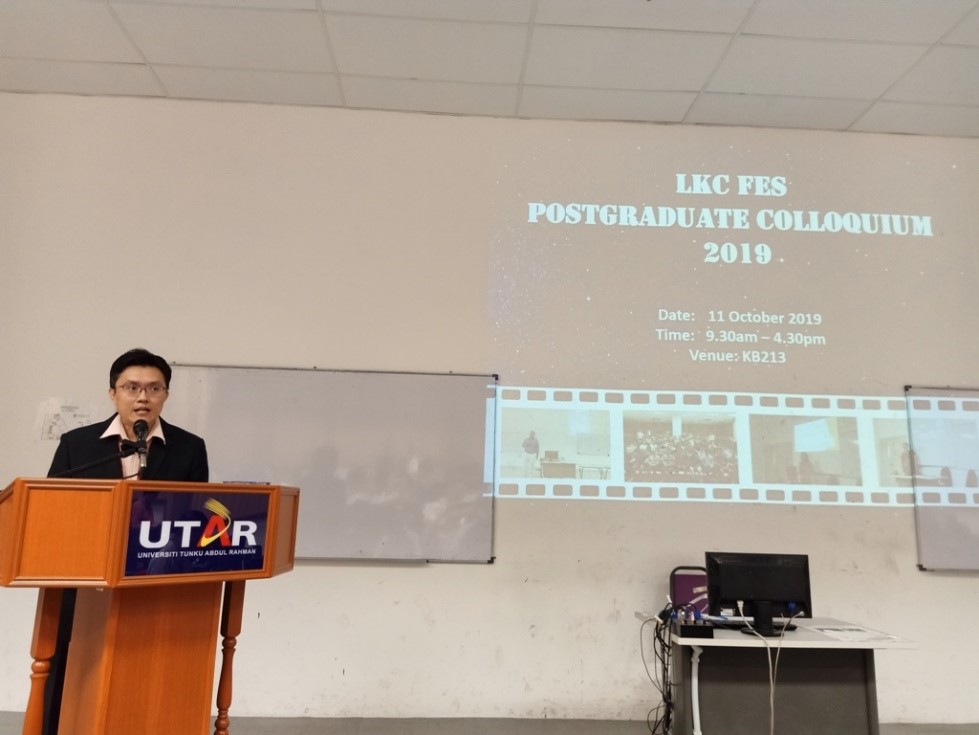
Opening Ceremony – Speech by Ir. Prof. Dr. Goi Bok Min 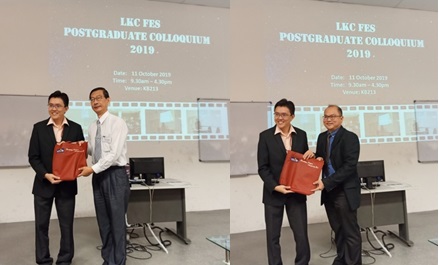
Souvenir presentation by Ir. Prof. Dr. Goi Bok Min to Prof Dr Kuen-Song Lin (left) and Ir Dr Ts Jeffrey Yap Boon Hui (right) 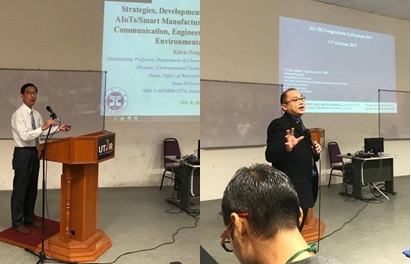
Keynote speeches by Prof Dr Kuen-Song Lin (left) and Ir Dr Ts Jeffrey Yap Boon Hui (right) 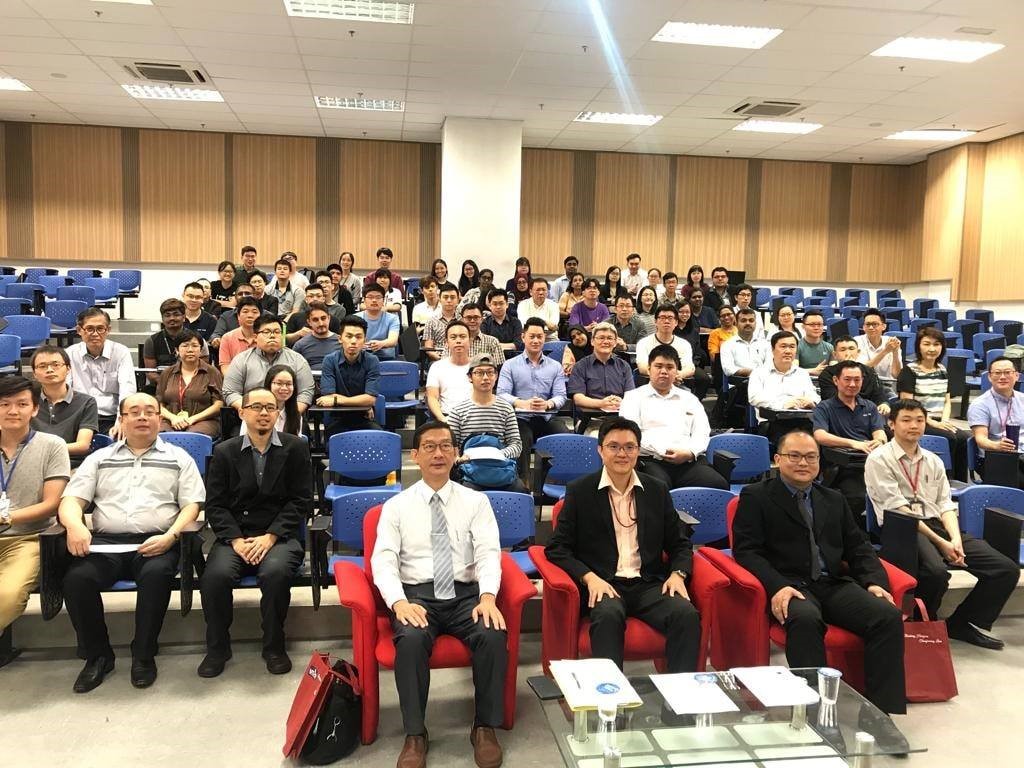
Group photo for LKC FES Postgraduate Colloquium 2019 |